|
|
|
Sort Order |
|
|
|
Items / Page
|
|
|
|
|
|
|
| Srl | Item |
| 1 |
ID:
181221
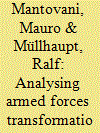

|
|
|
|
|
| Summary/Abstract |
There is scant research on models for visualising strategies retrospectively. The authors present a new analytical, visual methodology for assessing the transformation of armed forces, which is usually considered to be the “second dimension” of strategy. It is novel and generally applicable to armed forces, and additionally provides several benefits, in particular with regard to its synoptic character. The methodology translates a sociological approach into strategic studies, a discipline which has not really developed its own yet. It is exemplified by means of the (airborne part of the) Swiss Air Force's transformation since the end of the Cold War.
|
|
|
|
|
|
|
|
|
|
|
|
|
|
|
|
| 2 |
ID:
178237
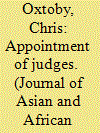

|
|
|
|
|
| Summary/Abstract |
South Africa’s Constitution provides multitudinous examples of clear breaks from past governance structures and practices. Regarding the judiciary, one of many significant changes has been in how judges are appointed. Prior to the onset of constitutional democracy, judges were appointed by the executive, with consultation with the senior judiciary but little or no scope for broader input from any other stakeholders. The Constitution established the Judicial Service Commission (JSC), one of the major functions of which is to recommend the appointment of judges. The JSC was intended to mark a decisive break with the previous appointment system, by creating a broad-based structure that includes politicians, lawyers and judges. The JSC interviews prospective candidates for judicial office in public and provides the opportunity for other stakeholders to engage in the process. This article assesses the performance of the JSC over the first 25 years of South Africa’s constitutional democracy. Several shortcomings will be discussed, including the failure of the commission to develop and apply clear and consistent criteria, challenges with implementing demographic transformation of the judiciary, managing the role of politicians and politics in the judicial appointment process, and an apparent aversion to appointing independently-minded judges, informed at least in part by a restrictive understanding of the principle of the separation of powers.
|
|
|
|
|
|
|
|
|
|
|
|
|
|
|
|
| 3 |
ID:
100056
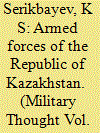

|
|
|
| 4 |
ID:
098363
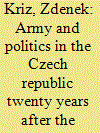

|
|
|
|
|
| Publication |
2010.
|
| Summary/Abstract |
This article focuses on relations between army and politics in the Czech Republic after the 1989 Velvet Revolution. This article concludes that these relations in the Czech Republic achieved the parameters typical of consolidated democracies. The many problems that continue to exist in this area in the Czech Republic do not in any significant way deviate from what is typical of consolidated democracies. Therefore, the transformation of civil -military relations can be regarded as successful.
|
|
|
|
|
|
|
|
|
|
|
|
|
|
|
|
| 5 |
ID:
163353
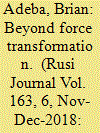

|
|
|
|
|
| Summary/Abstract |
South Sudan’s decade-old defence policy is dated. In this article, Brian Adeba argues that a new defence policy which is tethered to a national security framework that accounts for evolving security challenges and addresses missed opportunities for professionalising the Sudan People’s Liberation Army is necessary.
|
|
|
|
|
|
|
|
|
|
|
|
|
|
|
|
| 6 |
ID:
148267
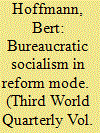

|
|
|
|
|
| Summary/Abstract |
Standard wisdom explains Cuba’s current transformation as one of economic change but political immobility. However, Cuban politics have also undergone a major change since the handing over of power from Fidel to Raúl Castro – even if the rhetoric used has been one of continuity. This article traces this process by looking at four areas: the depersonalisation and re-institutionalisation of the political structures; the diversification of the public sphere, particularly through the use of digital media; the liberalisation of travel and migration, with its transformative impact on state–citizen relations; and the turn to a moderate foreign policy, as highlighted by the rapprochement with the USA, with its implications for legitimising the underpinnings of Cuban socialism. Although the shift has been well below the threshold of a transition to multiparty democracy, Cuba has evolved from the charismatic model of the past to what can be understood as bureaucratic socialism in reform mode.
|
|
|
|
|
|
|
|
|
|
|
|
|
|
|
|
| 7 |
ID:
138288


|
|
|
|
|
| Summary/Abstract |
North Atlantic Treaty Organization (NATO) members such as Canada and Denmark have transformed their military forces to better engage in expeditionary warfare. They are incorporating advanced technologies to find and strike targets precisely from great distances at little risk to themselves. The persistence of unmanned aerial vehicles (UAVs) represents the next step in modern airpower’s long-range reconnaissance/precision strike complex and has transformed ground operations. Nonetheless, operational requirements in Afghanistan caught Canada and Denmark flat-footed. Ultimately, Canada effectively used UAVs while Denmark could not. Moreover, neither state has a UAV capability beyond small tactical systems (although each has plans to develop or join in the development of larger ones). The Canadian and Danish experiences suggest that ground forces are most likely to acquire and integrate small UAVs into their force structures and concepts of operation and that the air forces of small- and medium-sized Western countries will likely do so only in cooperation with others. It is here that the Canadian and Danish UAV paths may yet again cross.
|
|
|
|
|
|
|
|
|
|
|
|
|
|
|
|
| 8 |
ID:
157714
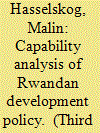

|
|
|
|
|
| Summary/Abstract |
This article provides a capability analysis of Rwandan development policy. It is motivated by impressive progress on human development indicators in combination with highly centralised policymaking, giving ambiguous signs regarding a capability approach. It is based on extensive original empirical material, along with large numbers of official documents and academic sources. The analysis is structured around three issues that concern the relation between individual agency and government policy, and that are debated among capability scholars as well as in relation to Rwandan development policy: participation, transformation and paternalism. The finding that Rwandan development policy reflects an approach very different from a capability approach is not surprising, but establishes that the assumed link between human development indicators and the capability approach needs to be questioned. This brings our attention to shortcomings in any quantitative measurements of development, or in the use of and importance attached to them, as well as to the problem of assuming that certain outputs go hand in hand with certain processes. While this is valid for contexts far beyond Rwanda, it also sheds light specifically on the polarisation that exists in the scholarly debate on Rwanda
|
|
|
|
|
|
|
|
|
|
|
|
|
|
|
|
| 9 |
ID:
170877


|
|
|
| 10 |
ID:
191079
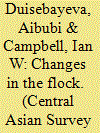

|
|
|
|
|
| Summary/Abstract |
By the end of the nineteenth century, the Russian Empire had significant economic potential. The dynamics of industrial growth influenced both territorial expansion and increased population, and the improvement of the transport system, which also contributed to the formation and development of industry. This process found its expression in the development of textile cloth production, which stimulated the growth of demand for wool and led to the development of commercial sheep-keeping. Sheep-keeping, which played a minor role on both peasant and private farms, became one of the most important economic interests of the empire. The tsarist government’s special interest in using the Kazakh steppes as a source of cheap raw materials for industry led Kazakh animal husbandry to gradually adapt to market requirements. Such changes ignored the fundamental role of traditional sheep-keeping in Kazakh culture and economic life. The loss of habitat and reduction of migration routes for Kazakhs, together with an increase in demand for livestock and livestock products, threatened the degradation of Kazakh sheep-keeping and the loss of a key element of culture.
|
|
|
|
|
|
|
|
|
|
|
|
|
|
|
|
| 11 |
ID:
111705
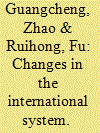

|
|
|
| 12 |
ID:
133841
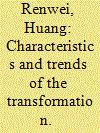

|
|
|
|
|
| Publication |
2014.
|
| Summary/Abstract |
The characteristics of the transformation of the contemporary international system are unprecedented since the birth of the Westphalian system, and even since the end of world war - II and cold war. The transformation of the contemporary international system is reflected firstly in the structural changes to international power, namely the transfer of power. The transfer of power and the transformation of the international order were accomplished through war throughout modern history
|
|
|
|
|
|
|
|
|
|
|
|
|
|
|
|
| 13 |
ID:
146490
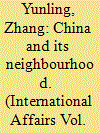

|
|
|
|
|
| Contents |
China and its neighbours are closely bound by geography. The rise of China presents new challenges and opportunities for the development of its neighbourhood relations and regional strategies. Currently, China's policy priority in its neighbourhood is active promotion of the construction of a community based on shared interests and a common destiny. The real challenge is that China's rise from a weak to a powerful state has triggered multiple and complex reactions and has required significant and profound adjustment of regional relationships. As a consequence there have been growing tensions in China's neighbourhood areas. Traditional Chinese culture sets the highest value on ‘peace and harmony’, commends the ‘defusing’ of contradictions and pursues the result of ‘reconciliation’. Now that China is getting strong and is able to make choices as it wishes, the time has come for it to display its ‘culture of harmony’.
|
|
|
|
|
|
|
|
|
|
|
|
|
|
|
|
| 14 |
ID:
058791


|
|
|
|
|
| Publication |
Fall-Winter 2004.
|
|
|
|
|
|
|
|
|
|
|
|
|
|
|
|
| 15 |
ID:
168176
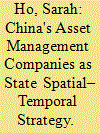

|
|
|
|
|
| Summary/Abstract |
Chinese authorities created four new asset management companies (AMCs) in 1999. These have since undergone profound transformations which have been influential in China's contemporary integration into the world market. Conventional interpretations see these powerful AMCs in largely technical and asocial terms. By contrast, we employ a critical geographical analytical framework to understand the transformation of these AMCs as an expression of the state's spatial–temporal strategy to create conditions of political economic stability now by displacing the conditions of financial instability and crisis into the future. This strategy does not come without unintended and destabilizing consequences, nor is it without class-based social and political implications.
|
|
|
|
|
|
|
|
|
|
|
|
|
|
|
|
| 16 |
ID:
107958
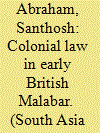

|
|
|
|
|
| Publication |
2011.
|
| Summary/Abstract |
This article examines the development of colonial law in Malabar between 1792 and 1810. Within the historical context of emerging colonialism as a pivotal factor, it shows that there was no simple unilinear process in the making of colonial law in this region of India, but rather a series of continuities and discontinuities of practices. A clear shift in the logic of governance is identified, however, as new technologies of power, particularly writing and documentation, resulted in several formalities of practices in the making of the colonial state and legal system in India.
|
|
|
|
|
|
|
|
|
|
|
|
|
|
|
|
| 17 |
ID:
135845
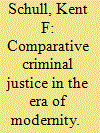

|
|
|
|
|
| Summary/Abstract |
This article lays out the broad transformations within the Ottoman criminal justice system over the course of the nineteenth century in order to demonstrate how the empire transformed its long-standing methods and approaches to criminal justice by adapting “modern” concepts and practices. In the end, it created an integrated system of justice that included new penal codes, police, courts, and corrections, thus demonstrating both its unique characteristics and its comparability with contemporary states. This article first discusses the problematic, but indispensable concept of modernity and how it has hindered comparative empire studies for the long nineteenth century. It then argues for an eclectic approach to comparative empire that adopts the concept of “improvisational blending” to understanding modernity and utilizes intermediate units of analysis in promoting the study of comparative empires. Finally, this article takes the transformation of the Ottoman criminal justice system during the late nineteenth and early twentieth centuries as an intermediate unit of analysis to illustrate a unique Ottoman modernity that is fully comparative on the trans-imperial level.
|
|
|
|
|
|
|
|
|
|
|
|
|
|
|
|
| 18 |
ID:
148262


|
|
|
|
|
| Summary/Abstract |
Cuba, this iconic revolutionary island which has brought so much hope to the Third World and, at one point, worry for a nuclear World War III, is going through a process of change never seen since Fidel Castro led his revolutionary forces to triumph around New Year’s of 1959. Yet, 10 years into the change process, led by the younger Castro Raúl (now 85), nobody can really forecast where the country will end up in socio-economic and political terms. In this TWQ subsection, two economists and three political scientists – two Cubans and three European Cuba watchers – analyse the reforms and their possible outcome.
|
|
|
|
|
|
|
|
|
|
|
|
|
|
|
|
| 19 |
ID:
083403


|
|
|
|
|
| Publication |
2008.
|
| Summary/Abstract |
A recent intelligence official argues that the National Intelligence Estimate (NIE) on Iran reflects initial intelligence reform, but warns that a fundamental and thorough transformation of the intelligence community culture, with seven steps to achieve it, is still needed … and time is running out.
|
|
|
|
|
|
|
|
|
|
|
|
|
|
|
|
| 20 |
ID:
084183
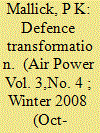

|
|
|
|
|
|
|
|